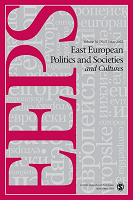A Post-Soviet Eco-Digital Nation? Metonymic Processes of Nation-Building and Estonia’s High-Tech Dreams in the 2010s
A Post-Soviet Eco-Digital Nation? Metonymic Processes of Nation-Building and Estonia’s High-Tech Dreams in the 2010s
Author(s): Epp AnnusSubject(s): Sociology, Human Ecology, Environmental interactions, Present Times (2010 - today), ICT Information and Communications Technologies
Published by: SAGE Publications Ltd
Keywords: post-Soviet; national imaginary, information technology; environmentalism; orientalism;
Summary/Abstract: How do Estonians imagine themselves as a nation? According to a popular Estonian essayist, a proper Estonian digs his garden on Mondays and mines his bitcoins on Tuesdays. This article focuses on Estonian imaginaries to study the grounding structures of Estonian identity-creation in the 2010s and it articulates the core of a canonized understanding of Estonian identity as “eco-digital nationhood.” The article explores Estonia’s eco-digital national model as produced by an aesthetic screening, supported by a Western gaze adapted for local purposes of positive identity creation. In Estonia, international approval (for its reputation as a digital nation) has fostered a national selfimage of living in a digital state. Technological advancement combined with idealizations of natural environments have sometimes produced “eco-ambiguous” results, as in efforts to encounter nonhuman life-worlds without leaving one’s own comfort zone. In other instances, the eco and the digital function as two alternating modes of selfhood, the eco-part sometimes finding expression in the narratives of ethnic particularism, the digital part figuring Estonia as a herald of western modernism prudently adapting itself to the digital future. Discrepancies between the eco-digital imaginary and the many less flattering elements of Estonian actuality highlight selective (self-)representative strategies in narratives of national success. Nation building here emerges as a metonymic process, wherein certain parts of culture are foregrounded to represent the whole— while other parts, including substantial parts of the Soviet heritage (material, demographic, social, psychological) languish as unsuitable to be framed.
Journal: East European Politics and Societies
- Issue Year: 36/2022
- Issue No: 02
- Page Range: 399-422
- Page Count: 24
- Language: English
- Content File-PDF

